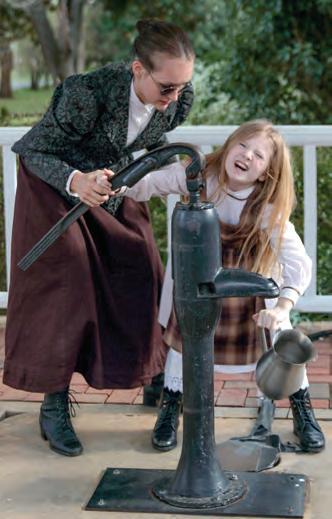
2 minute read
A tale of two cities, and their plays
By Emmett Burnett
What are the odds that two of America’s most beloved plays originated and are performed in the same state? Of course we speak of Alabama’s theatrical duo of distinction: “The Miracle Worker” and “To Kill a Mockingbird.” Together, they are Tuscumbia and Monroeville’s tale of two cities. Each play features a strong female child leading role – Helen Keller and Jean Louise “Scout” Finch. Both shows are performed – at least partly – outdoors, on sites where the story occurs. And each play evokes goosebumps.
Let’s look behind the curtain at Alabama’s plays of world renown.
The Miracle Worker
Tuscumbia’s deaf blind girl who sees with her heart is the epitome of triumph over tragedy.
“The history of Helen Keller and Annie Sullivan is one of amazement,” says Jonathan Moore, who plays Helen’s father, Captain Arthur Keller. “It is indeed a miracle. Before Helen Keller, people either lived with being deaf and blind or they were committed to an asylum,” Moore adds. “Annie gave Helen’s life a meaning and purpose.”
Darren Butler, who directed Tuscumbia’s play for about two decades, agrees. “This is more than a play,” the Orange Beach resident says. “For many, it is a pilgrimage. Helen and Annie redefined how we treat those with special needs.”
Preseason auditions are held annually to select the cast. Adult actors often reclaim their roles but child actors, especially those portraying Helen, are good for about two years because, well, they grow up.
“The amount of rehearsals depends on how many new people we have,” says director Caroline Self. “Much emphasis is placed on the actress who plays Helen. I played her, and understand how hard that role can be. We are asking a child to take on huge responsibilities. She is working with adult actors in live theater.”
Butler agrees: “We are looking for a girl who can keep her eyes still. We have to trick the audience into believing she cannot see or hear. Helen has no lines except ‘wa-wa.’ But inside her mind she is running internal dialogue.
“We want a girl who can tell the story through facial expressions and body actions.”
Not every child can play the key role but Lillie Meyer can. “It is an honor to portray Helen Keller,” says the 12-year-old actress.

Performed on the lawn of the Keller’s home, Ivy Green, Helen discovers “wa-wa,” as water trickles over her fingers from a world-famous pump. The prop is literally a hundred yards from the real one. In the iconic scene, water not only drips from the pump, it tears in audience’s eyes.
Lillie makes it look easy. It is not. She notes, “In rehearsals and research, I discovered how to portray the movements and facial expressions of a blind and deaf person.”
“One of the hard parts is learning how to be slapped,” she explains, referencing the “fight scene” between Helen and Annie Sullivan. “Knowing you are about to be slapped but not flinching, takes practice but it’s vital.” A blind person about to be slapped would not flinch, and therefore, neither can Lillie.
Every act, mannerism, and movement is scrutinized to the last detail. The playwright insisted on it. Caroline Self and Darren Butler had the opportunity to meet ‘The Miracle Worker’s’ creator, William Gibson, in his Massachusetts home. Gibson considered Ivy Green to be hallowed grounds.
“He told us ‘The Miracle Worker,’ performed at Helen Keller’s home, must be the best here, as in any place in the world. For this is where it all happened,” recalls Self, about Gibson’s beliefs. “I never want the cast to forget that. We walk the grounds and tour the house before starting rehearsal to connect the story to what we are telling.”
Jonathan Moore notes, “Helen Keller and Annie Sullivan are more than historical figures. They are heroes. Therefore, we want to create the best product we can.”
Appreciative audiences say thank you – some while wiping their eyes.
Performances
“The Miracle Worker,” June 2, 3, 9, 10, 16, 17, 23, 24; July 7-8, 14-15. (No production June 30 - July 1); Friday and Saturdays at 8 p.m.; gates open at 7 p.m. Reserved seats, $20; groups of 20 or more, $17; general admission, $15 For more information, visit helenkellerbirthplace.org








